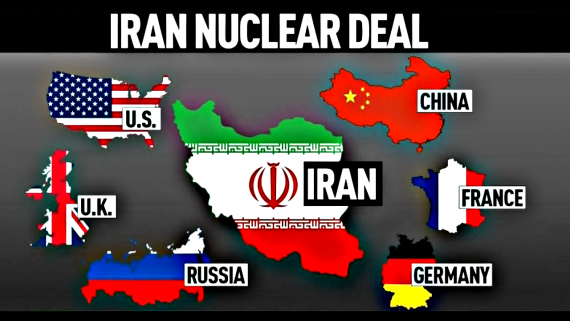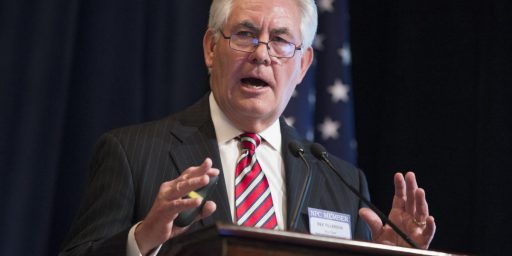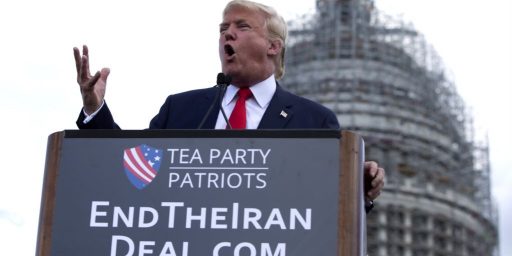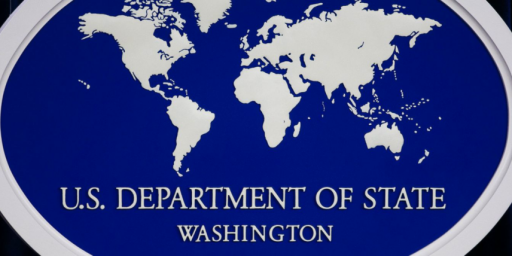European Allies Rebuffing American Efforts To Renegotiate Iran Nuclear Deal
America's closest European allies are rebuffing the Trump Administration's efforts to renegotiate the nuclear deal with Iran. They're right to do so.
Secretary of State Rex Tillerson has been meeting with America’s European allies this week with the ostensible purpose of getting them to go along with the Administration’s efforts to renegotiate the terms of the Joint Comprehensive Plan Of Action (JCPOA) the deal reached between Iran and a group of other nations regarding Iran’s nuclear research program. Suffice it to say that things aren’t going well:
The Trump administration on Tuesday pressed ahead with efforts to convince European allies to add tough new requirements to the Iran nuclear deal, a move met with deep skepticism in France where the foreign minister insisted “signatories must stand by their word.”
A day after similar talks in London with British officials, U.S. Secretary of State Rex Tillerson met with French Foreign Minister Jean-Yves Le Drian to make the case in what were expected to be tense discussions.
The two greeted each other cordially at the French foreign ministry, but ahead of the meeting, Le Drian expressed annoyance that the U.S. was pressuring Europe to redesign the deal to prevent President Donald Trump from withdrawing from it.
“There is a basic principle on which we are very firm, it’s the upholding of the (nuclear deal) to the extent it is respected,” Le Drian said, noting that the U.N. nuclear watchdog has said Iran is in compliance.
“If it is respected by Iran — which is what the IAEA says, and we don’t have any reason not to believe it – the signatories must stand by their word,” Le Drian added. “Because when an agreement is signed, each signatory must respect it. He (Tillerson) knows it.”
Le Drian also questioned why the Trump administration is “kicking the ball back to Congress and the Europeans,” when Russia and China also signed the deal.
Trump has threatened to abandon the deal this spring unless it is fixed to his liking. Tillerson is in Europe this week seeking support for a side deal under which the Europeans would join the U.S. in reimposing sanctions on Iran if it continues ballistic missile testing, refuses U.N. inspections of sensitive sites or resumes advanced atomic work even if such activity is gradually permitted by the nuclear deal.
The administration is also working with Congress to amend or replace U.S. legislation that governs Washington’s participation in the nuclear deal, which was a signature foreign policy achievement of the Obama administration but has been denounced by Trump as the worst agreement ever negotiated by the United States.
After his talks with British officials on Monday in London, Tillerson sounded cautiously optimistic about getting European backing. He said the U.S. and Britain, France and Germany had a “common view” that the nuclear deal should be supplemented. He said the four countries had agreed to set up a working group of experts on fixing what Trump says are flaws in the deal. The working group is expected to start meeting as early as next week, he said.
As Paul Pillar notes, Trump’s efforts are largely impeded by the fact that the agreement is working:
Trump’s effort is impeded by the fact that the JCPOA is working. It continues, as confirmed by international inspectors, to fulfill its purpose of blocking all possible paths to a possible Iranian nuclear weapon. Iran continues to comply with its obligations under the agreement. As such, the JCPOA continues to serve the interests of the United States and of international security and the cause of nuclear nonproliferation. These evidently are not interests that motivate Trump, but he cannot afford to be honest about his actual motivations. The fact that the agreement is working prevents him from making any case for withdrawing from the agreement directly and
(…)
The Trump administration already has violated not only the spirit but also the letter of the JCPOA by, for example, urging other member states of the G-20 to end commercial ties with Iran. This violates the commitment in paragraph 29 of the JCPOA for the parties to “refrain from any policy specifically intended to directly and adversely affect the normalization of trade and economic relations with Iran inconsistent with their commitments not to undermine the successful implementation of this JCPOA.” The more that the United States piles additional sanctions on Iran, ostensibly for non-nuclear reasons, the more this negates the effects of relief from the nuclear sanctions.
Even just the sowing of doubt about the future of the agreement has economic effects—by stoking wariness in the private sector about doing any new business with Iran—that make the JCPOA less attractive to Tehran. This week’s White House statement, bristling with threats to pull out of the agreement, serves that purpose for Trump.
The overall effect of all of the administration’s hostile measures, including formal ones as well as wariness-stoking rhetorical ones, is similar to what the administration has done to another major accomplishment of Trump’s predecessor, the Affordable Care Act. That process already has gone far enough for Trump to claim last month, “We essentially repealed Obamacare.” He cannot yet make that claim about the JCPOA, but that’s the direction he’s headed.
It was in October, of course, that President Trump declined to certify to Congress that Iran was complying with the deal that was finalized in the fall of 2015, following through on a promise he made several times during the campaign for President during which he repeatedly bashed the agreement without specifying exactly how he would change it. While Trump’s decertification didn’t formally withdraw the United States from the agreement or result in an effort by the Administration to reimpose sanctions against Iran that had been lifted as required by the agreement, it was taken by many at the time that this further step could come at any time in the future. This action came despite the fact that members of Trump’s foreign policy team including Secretary of Defense James Mattis and Tillerson himself had both gone on the record as saying that Iran was in compliance with the agreement and that staying in the JCPOA was in the national interest of the United States. The action also came notwithstanding the fact that the International Atomic Energy Agency (IAEA), the agency charged with running the inspections called for under the agreement said that Iran is complying with the agreement in its most recent report on the agreement. Instead, Trump said that Iran was violating the “spirit” of the agreement without specifying what that means and went on to cite things that were not covered by the terms of the JCPOA such as Iran’s missile program, the foreign policy positions it has taken that are often adverse to those of the United States, and actions that took place in the past such as terrorist attacks that took place as long as twenty years or more in the past. Earlier this month, leaders of the U.K., France, and Germany took the time to issue a statement of support for the JCPOA and made clear that they did not support the position taken by the Trump Administration. Finally, the other two parties to the agreement, Russia and China, have made clear that they don’t support this unilateral action on the part of the United States.
As the above-linked article goes on to note, our European allies have made some indications that they might back American efforts to explore ways to strengthen the deal. It’s clear, though, that this rhetoric is mostly designed to assuage the Trump Administration in an effort to prevent the entire deal from falling apart, something that could well happen should Trump decide to take further steps along the lines of what he did in October. As Daniel Larison notes, though, it’s fairly clear from his rhetoric that the President doesn’t really want to fix the JCPOA:
It has been clear for years that Trump wants to renege on the nuclear deal, but it’s also clear that he wants to be able to blame someone else when he does so. The problem for Trump is that his bad faith on this issue is so obvious to everyone that his attempt to shift the blame for his poor policy choices won’t work. Our European allies won’t yield to his ridiculous ultimatum because they have no reason to do so. If the U.S. opts to break the commitments it made under the Joint Comprehensive Plan of Action (JCPOA), it will do so without obtaining their assistance in providing political cover. The EU and the governments of Britain, France, and Germany have all been very clear that they see no need to revisit or revise the agreement, and there is no interest in renegotiating something that was already successfully conclude the first time. Our allies oppose U.S. efforts that put the agreement in jeopardy, and they are not going to participate in a transparent attempt to blow up the deal.
The president has telegraphed his desire to scrap the deal so often that no one can honestly believe that he wants the deal “fixed,” and the content of his demands confirms as much. The “flaws” that Trump wants to “fix” aren’t really flaws at all, or they are compromises that had to be made in order to secure the important concessions that Iran made. For example, restrictions that expire after an agreed period of time are an unavoidable part of any nonproliferation agreement. These are some of the provisions that have made a successful nuclear deal possible in the first place. None of the other parties to the JCPOA views these things as a problem that needs to be solved. Trump insists that the deal’s limitations and the additional restrictions he wants be maintained in perpetuity, but that is a non-starter with Iran as well as being entirely unnecessary.
Iran hawks have been trying to sabotage the nuclear deal even before it was concluded, and once a deal was reached they have looked for any excuse they could find to scrap it. The difficulty for opponents of the deal is that it has worked exactly as intended and has been entirely successful, and so they have had to keep moving the goalposts to make it seem as if the deal has fallen short. Of course, most opponents of the JCPOA are opposed to any deal with Iran that could realistically be made because they loathe the very idea of diplomatic engagement with Tehran, so the details have always been and will always be beside the point for them. Trump has been a willing accomplice in this because he has been determined to do what he can to erase Obama’s legacy and because hostility to Iran seems to be one of the only consistent things in his foreign policy. Lacking the faintest understanding of any of the relevant issues, Trump has echoed the hawks’ pathetic complaints about the agreement.
Perhaps it’s possible that Trump will be pulled away from the brink of scrapping the deal entirely by the fact that our European allies are unwilling to go along with his hardline position. The fact that he has so far only taken the largely symbolic step of declining to certify Iranian compliance and has also given the indication that he will move forward with the latest round of sanctions relief called for under the agreement, albeit reluctantly. The fact that he even took the mostly symbolic step of decertification, though, combined with his previous statements about the JCPOA and his mercurial nature means that we won’t know for sure what the President will do until he actually does it. The smart move, of course, would be to lift the sanctions as required given the fact that all of the available evidence continues to show that Iran continues to comply with its obligations under the agreement. This President, though, has already shown several times in the past that it seldom does the smart thing so it’s hard to say what will happen. Failure too lift the sanctions, of course, would mean that the United States is not in compliance with the agreement, and that could give the Iranian hardliners the impetus they need to argue that they were right and that the United States cannot be trusted to live up to its obligations under any agreement. In that case, it would likely be up to nations such as Britain, France, and Germany, along with China and Russia, to keep the agreement in place even as the United States goes its own way.







What good does it do to unilaterally sanction Iran if the rest of the world doesn’t care? They can sell oil to China, buy weapons from Russia and get luxury goods from Europe. Hurts our economy, and makes us look like fools.
@Mu:
Same with N. Korea…Russia and China just keep selling them oil and doing trade with them.
Let me say from the start that although there were serious reservations, problems, and drawbacks, an agreement with Iran was better than nothing.
I wonder if we did not give away the store in this agreement. In the words of one member of Congress, Secretary Kerry got “bamboozled”. And: shaked and baked, flipped and flopped, roasted and toasted, parched and starched, hackled and tackled, and hung out to dry.
After the way Iran treated the US in 1979-1980, they should have been a lot more gracious and thankful for any terms short of a B-52 raid.
After the agreement was signed, the leaders of Iran threatened the US and Israel with “destruction”, and hung President Obama in effigy. Some thanks.
If these other countries want to cozy up to Iran and think they can be trusted, they are in for a rude awakening.
@Mu: Trump could wind up negotiating a “better” deal where the US has to provide nukes to Iran, and he’d be happy about it because it is HIS deal.
BTW, Kim’s refusal to seriously negotiate with Trump is the exact opposite of irrational.
@Tyrell:
Dude, if the deal was so bad why are the Europeans – who are at much greater risk than we are – not concerned?
Any idiot Congressman can say anything even if they know nothing. So if you want to convince me this is a bad deal show me someone with some skin in the game and some knowledge. The only other person with his hair on fire is Bibi. Now, Bibi may be right or Bibi may be wrong, but the word of a Likudnik and known liar doesn’t go far with me.
Is there evidence that the mullahs are suicidal enough to actually use a nuke? Nope. They seem to be very good survivors. Which means they can be deterred, just like we deterred Stalin and Mao.
@Mu:
Hey, we sanctioned Cuba all by ourselves for decades, look how well that worked out. We set out to depose Fidel Castro and he’s gone. Handing off to his brother due to ill health after becoming the longest serving head of state in the world.
@Tyrell: Care to name said Congressman so we can all judge his credibility?
@michael reynolds: Those are very valid points. I agree.
Befriending Iran was in our national interests when we supported the Shah. We wanted a big oilproducer in OPEC who was not an automatic Saudi vote. We wanted someone in the region who would block Russian regional expansion. Those two goals are valid goals today. It is in our national interest to seek warmer relations with Tehran. It is the sane thing to do. We have formed relationships with lots of dictators, oppressors of their nations to further America’s interests. We need good relations with Iran.
@Tyrell: Iranians rebelled in 1979 against a U.S.-backed dictatorship that routinely tortured and murdered its own people by the thousands. Why would we expect them to have had the slightest goodwill toward the United States?
@Ben Wolf:
Because they have more troubling opponents, namely Saudi Arabia. And they have potentially troublesome neighbors in the form of former Soviet states. And they have a large, youthful and restive population that would like more stuff from the outside world.
Ben, the rest of the world does not share your naiveté. South Korea gets along with Japan despite Japan’s brutal occupation. China gets along with Japan despite Nanking. Poland is on good terms with Germany, as does France, Great Britain, etc… Hell, Israel is on close terms with Germany. In fact if we’re citing history, Canada gets along with us despite the fact that we invaded them and tried to take their country.
The Shah died 38 years ago. The median age of Iranians is 27, meaning that most Iranians were ten years away from being born when the Shah died in exile. If we restored full diplomatic relations with Iran and took down the sanctions the Iranian people would dance in the streets.
@michael reynolds: Please re-read, because you’ve missed the past-tense of Tyrell’s comment and my response.
@Tyrell:
What are you writing, are every American this foolish. Let me remind you that in the late 70’s the US suppprted Iraq to attack Iran, go look it up. It means the US try to invade Iran and take control of Iran government and its resources. When it comes to Israel, Netanyahu threatened Iran on a daily basis, just read the news from Israel. I know in the US media and in the eyes of the stupid American people, Israel and the US can do no wrong, but the warmongering in Afghanistan, Syria and Iraq speak for themselves. And going back in history the US attack on the people of Vietnam, North Korea, Somalia, Libya and on and on, also shows that the US is a monster that cannot be trusted. So the next time you see bunch of people in another part of the world protesting and chanting, “Death to the US” is because of the US commitment to genocide, invasions and warmongering acts across the war.
@Shima: I have personally explained to Tyrell the history of the US with Iran from the USA’s overthrowing of the democratically elected government in Iran in order to install a brutal dictator (the shah) that then went on to murder and torture hundreds of thousands all the way up to the USA selling Iraq chemical weapons to use on Iran. I have explained this to him at least 5x by now and he just pops back in a different post with the kind of crap you see in this thread.
Tyrell is either a performance by someone under a different name or he’s a russian troll.